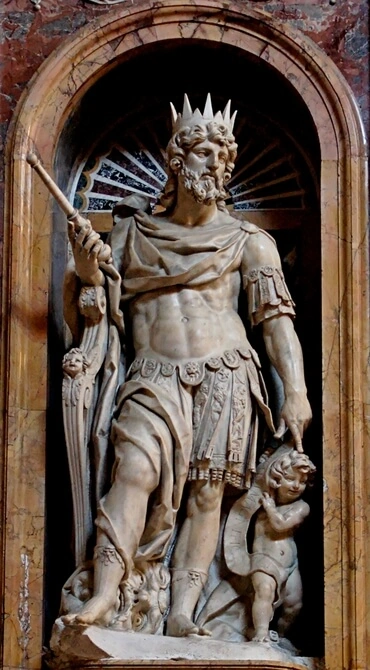1
And it was, when David and his men◦ had come to Ziklag on the third day, that the Amalekites had attacked the south and Ziklag, and had smitten Ziklag and burnt· her ·up with fire.
2
And they took··captive the women that were therein, from the small even··to the great; they did· not ·put· a man◦ ·to··death, but carried them off and went their way.
3
And David and his men◦ came to▵ the city, and behold, it was burnt with fire; and their wives, and their sons, and their daughters, were taken··captive.
4
And David and the people who were with◦ him lifted··up their voice and wept until there was no more power in them to weep.
5
And the two wives of David were taken··captive, Ahinoam the Jezreelitess, and Abigail, the wife of Nabal the Carmelite.
6
And David was· very ·distressed; for the people said that they would stone◦ him, for the soul of all the people was··bitter, each··man◦ over his sons and over his daughters; but David confirmed himself in Jehovah his God.
7
And David said to▵ Abiathar the priest, the son of Ahimelech, Present to me now◦ the ephod. And Abiathar presented the ephod to▵ David.
8
And David asked of Jehovah saying, Shall I pursue after this troop? Shall I overtake them? And He said to him, pursue, for overtaking thou shalt overtake, and rescuing thou shalt rescue.
9
And David went, he◦ and the six hundred men◦ who were with◦ him, and they came to◦ the brook Besor, and the remainder stood still.
10
But David pursued, he◦ and the four hundred men◦; but two··hundred men◦ stood still, who were· too ·faint◦ to cross··over the brook Besor.
11
And they found a man◦, an Egyptian◦, in the field, and took him to▵ David, and gave him bread and he did eat, and gave· him water ·to··drink◦;
12
and they gave him a piece◦ of a clump of figs, and two clusters··of··raisins, and he did eat; and his spirit returned unto▵ him, for he had not eaten bread, and had not drunk any water, three days and three nights.
13
And David said to him, Whose art thou◦? And whence art thou◦? And he said, I▵ am an Egyptian◦ lad, servant to a man◦, an Amalekite; and my lord left◦ me, for I became sick on the third day.
14
We◦ attacked the south of the Cherethites, and on that which is of Judah, and on the south of Caleb, and we burnt··up Ziklag with fire.
15
And David said to▵ him, Wilt thou bring· me ·down to▵ this troop? And he said, Promise to me by God, that thou wilt not▫ put· me ·to··death, and will not▫ close· me ·up in the hand of my lord, and I will bring· thee ·down to▵ this troop.
16
And he brought· him ·down, and behold, they were extended over the face of all the land, eating and drinking, and celebrating, with all the great spoil that they had taken from land of the Philistines and from the land of Judah.
17
And David smote them from the twilight and until the evening of the morrow. And there escaped not a man◦ of them◦, except four hundred men◦ of youth, who rode on camels and fled.
18
And David rescued all that Amalek had taken; and David rescued his two wives.
19
And there was nothing lacking to them, from the small even··to the great, even··to sons and daughters and from spoil even··to all that they had taken for themselves; David returned all.
20
And David took all the flocks and the herds; they drove on before these livestock, and said, This is David’s spoil.
21
And David came to▵ the two··hundred men◦, who were· too ·faint◦ to go after David, and whom he had made to sit at the brook Besor; and they went··forth to meet David, and to meet the people who were with◦ him; and David approached with◦ the people, and asked them of their peace.
22
And every evil man◦, and those of Belial, from the men◦ who had gone◦ with David, answered and said, Because they went◦ not with us, there shall not be given them of the spoil which we rescued, except▫ to a man◦ his wife, and his sons; and they would drive them away, and they would go.
23
But David said, You shall not do so, my brothers, with that which Jehovah has given us, and He has kept us safe, and has given the troop that came against us into our hand.
24
And who will hearken to you in this word? For as the part of him that goes··down to the battle, so shall be the part of him that sits by◦ the vessels; they shall part it as··one.
25
And it was, from that◦ day and upward, that he set it for a statute and for a judgment for Israel, to◦ this day.
26
And David came to Ziklag, and sent of the spoil unto the elders of Judah, to his companions, saying, Behold, a blessing for you from the spoil of the enemies of Jehovah,
27
to them in Bethel, and to them in Ramoth of the south, and to them in Jattir,
28
and to them in Aroer, and to them in Siphmoth, and to them in Eshtamoa,
29
and to them in Rachal, and to them in the cities of the Jerahmeelite, and to them in the cities of the Kenites,
30
and to them in Hormah, and to them in Bor-ashan, and to them in Athach,
31
and to them in Hebron, and to all the places where▵ David and his men◦ had lived.







